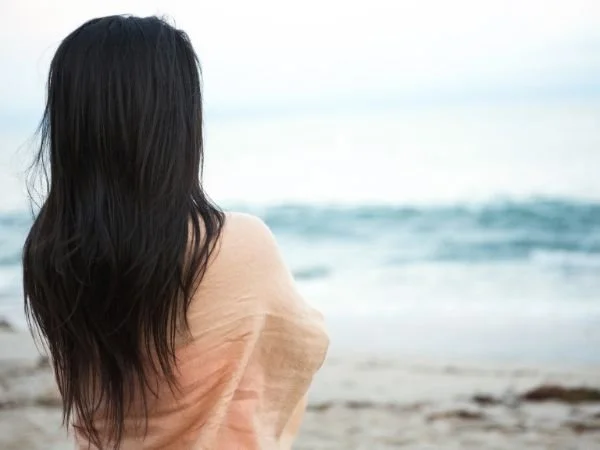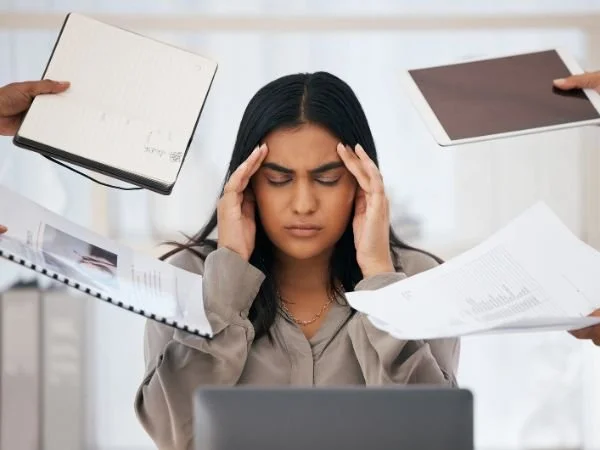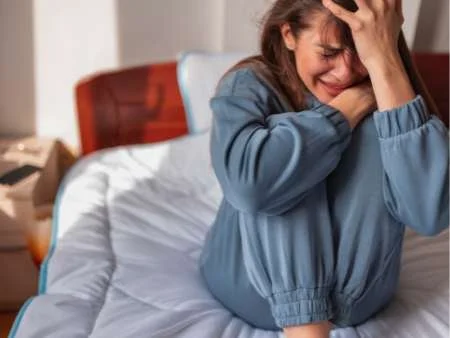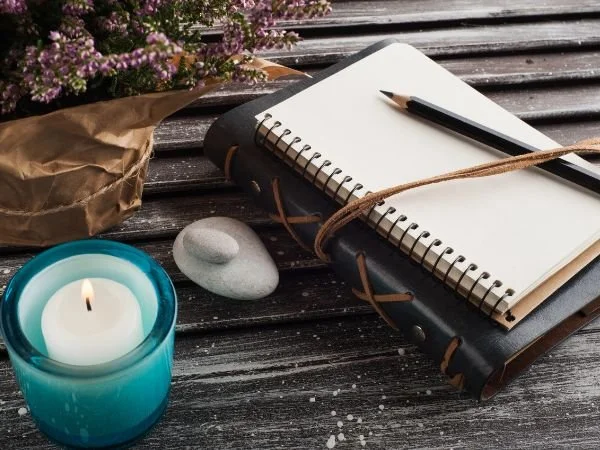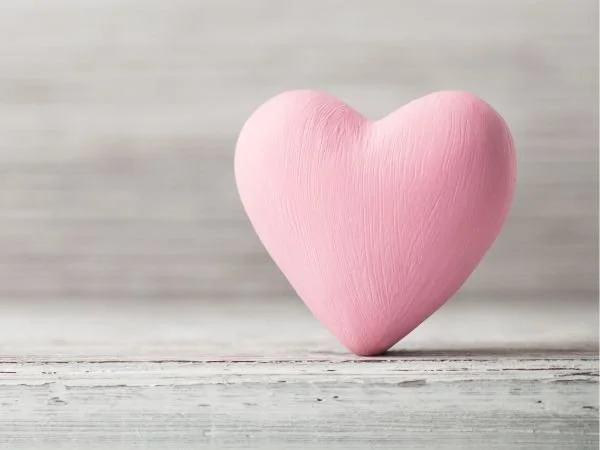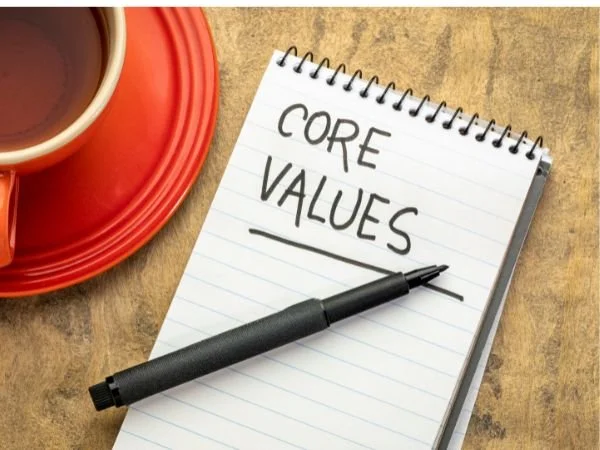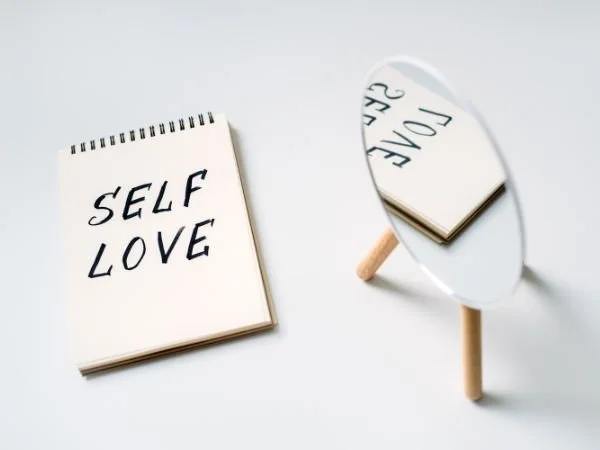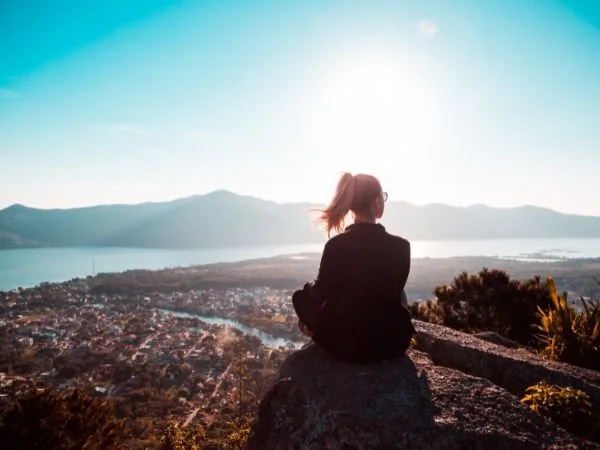133: Living Without Justice: Healing When Your Rapist Isn’t Punished
In this episode, I open up about the painful journey of healing from sexual violence—especially the heartbreak of not seeing your rapist held accountable. As a fellow survivor, I share how I’ve navigated a world that often protects the “nice guy” and fails survivors. We talk about validating our emotions, reclaiming our voice, why justice and healing don’t always align, and how to keep choosing ourselves. I also share practical resources, tips for finding support, and ways to reconnect with purpose after trauma. If you are a survivor of sexual violence, you are not alone. I am sending you so much love.
This post contains affiliate links to some of my favorite tools and resources. As an Amazon Associate, I earn from qualifying purchases. Full terms & conditions here.
Check out the New View Advice Healing from Sexual Trauma 🩵
For Immediate Support (Not New View Advice Affiliated)
RAINN 24/7 Hotline: 1-800-656-HOPE (4673) | rainn.org
Free online community: aftersilence.org/forum
Reflections - Stories from My Journey Healing from Rape
Recommended Episodes 🎙️
127: Why Talking About Sexual Assault is Hard & Tools to Help You Begin
46: Healing Sexual Trauma: Recovering from Sexual Assault & Rape through Healing One Layer at a Time
Book Recommendation
Know My Name by Chanel Miller
Check out these Blog Posts ✨
Timestamps ⏱️
Intro – 0:05
Listener Question – 2:14
Outro – 28:44
Have you followed and left a review for New View Advice?
Let me know what you think of the podcast! Podcast followers and ratings help bring new listeners to the show, as well as help me to continue creating content. So if you enjoyed the show, I’d love to ask you to follow and leave a rating on your podcasting platform by:
Head to New View Advice on Apple or Spotify
Click Follow on your podcasting platform
Scroll down (or when promoted) click the 5 star rating!
-
This podcast was transcribed by an AI tool called Castmagic. Please forgive any typos or errors.
Amanda Durocher [00:00:01]:
Welcome to New View Advice with Amanda Durocher. Hey, beautiful soul. Welcome to New View Advice. My name is Amanda Durocher, and if you're new here, this is a healing centered advice podcast where I offer guidance for the healing journey. I don't believe I have all the answers you seek. I believe you have all the answers. You just may need a new View and a little help along the way. Thank you so much for joining me for today's episode.
Amanda Durocher [00:00:20]:
Today I'm answering a question about sexual violence. Today's question is how do I get over the fact that my rapist wasn't prosecuted or punished in any way? As a fellow rape survivor who also did not receive justice through the criminal justice system, I thought this was such a great question that so many people can relate to. I know I can relate to this question. And truthfully, when I received this question, I was like, yes, this is a great question. But also I was like, oof, I don't know the answer to this question. I've really been pondering it over the past couple weeks because I think it's such an important question, and I think it's something that so many of us navigate is having to be honest with ourselves about how difficult it is to to live in a world where we feel devastated, heartbroken, and so many difficult feelings after being raped. And the person who did this doesn't take any accountability. They are not punished.
Amanda Durocher [00:01:08]:
There is nothing done to them, and they seem to just live their lives. How do we move on? And I think that this is an individual journey for every survivor, and I don't think there's necessarily a right answer to this question. So I just want to say that up front. But in today's episode, I wanted to dive into things I found helpful on my own journey and also the truth of healing from rape and how so often it's not really how do we get over it, it's how do we accept what we've been through and honor ourselves and our truth along the way? So before we jump into today's question, I wanted to mention that if you haven't already, I invite you to check out newviewadvice. Com on newviewadvice.com I have a Healing from Sexual Trauma hub where I have resources I put together that I found helpful on my own journey. I don't expect everything to be helpful for everybody, but I put that together in hopes that maybe it can assist you on your own healing journey. Because I know sometimes it's hard to find resources for healing from this trauma specifically. So if you are interested, you can check that out after the website@newview advice.com and with that, let's jump on into today's listener question.
Amanda Durocher [00:02:14]:
Dear Amanda, how do I get over the fact that my rapist wasn't prosecuted or punished in any way? Everybody knows about it, and maybe two people stopped being his friend and believed me. And he goes to my school. He's a general nice guy, so it's hard to understand that he did something so bad for people. Thank you so much for this question. I am so sorry that you are navigating this situation. I think it goes without saying, but I do want to say I am so, so sorry for what you survived. And I think when we haven't gone through the criminal justice system and we haven't had anybody be prosecuted for a violent crime, it can be hard for us to remember that what we survived is a violent crime. I often have to remind myself that on those days where I catch myself judging myself and say, ugh, why am I not over this yet? I often take a deep breath and I remind myself that this is what it's like to survive a violent crime.
Amanda Durocher [00:03:07]:
This is what it's like to heal from a violent crime, and there is no right way to heal from rape. And I also remind myself that whatever I am feeling is valid. And so with you here, my guess is you have a lot of feelings around this. Like, how do you get over the fact that your rapist wasn't prosecuted and people view him as a nice guy? My guess is you have some anger. You maybe feel betrayed, maybe you feel shocked, maybe you feel heartbroken, maybe you feel confused. I know for me, confusion was one I felt throughout my journey, especially when I was still in high school. It was a very hard thing for me to look at. I don't want to go into everything today about my experience, but I was raped in high school by a group of boys.
Amanda Durocher [00:03:52]:
I was gang raped. And then I didn't actually begin to look at this trauma until my 20s. And when I began to process it, I saw so many beliefs that were created and why I wasn't able to look at it at the time, why I wasn't able to get support. I saw how I was blamed, how the narrative was changed that I was a slut and things like that. As I mentioned, I experienced rape in my teen years. I also was sexually assaulted in my youth and in my 20s. And I didn't look at any of these traumas until my 20s. I actually repressed everything which is a common trauma response.
Amanda Durocher [00:04:22]:
So wherever you're at on your journey, no judgment here. I just wanted to mention the confusion here because I actually realized recently that confusion is something I use as a defense mechanism to this day, that sometimes if there's something too hard for me to look at, I'll tell myself I'm confused about it, and I'll fall into a place of confusion rather than allowing myself to feel in my body what my body is telling me. Because many times when I feel confusion, it's that my mind and my body are telling me two different stories. And when healing from rape, one of the things we do is we reclaim our bodies and we connect back to our bodies, and we learn that our bodies hold the truth, our feelings live in the body. And so it's one of the most important things you can do from healing from rape is to allow yourself all your feelings. And I mentioned that here, because how do you get over it? You allow yourself every feeling that arises, and those feelings will continue to show you your way forward and your way to healing. Because I don't know if you get over it. There are still days that I go to therapy and I say that same thing that you said.
Amanda Durocher [00:05:24]:
I say, why am I still talking about this and these men are married. Why am I still impacted by something that happened to me 15 years ago and I don't even know if they remember it? That's the truth. That's the reality, is that there are still days that the question you asked pops into my mind. But time and time again, I come back to one thing I heard once, which is sad but true, is you can either have justice or you can have healing, but you can't have both. And so often going through the criminal justice system or trying to get the other person to take accountability is a fool's errand. It's not going to bring you the healing or the peace that you seek. And it's a sad truth that it's justice or healing, because oftentimes these perpetrators, these rapists, aren't going to take responsibility for what they did. Even if you bring it to the court system, it's so often they're still going to deny what they did.
Amanda Durocher [00:06:15]:
And I mention that because it's a devastating reality of survivors that so often we will not get the justice we deserve. So I also want to state that here that you do deserve justice. You deserve for this person to take accountability and to be punished accordingly for committing a violent crime. You deserve that. But the truth is, our society isn't necessarily there yet. And so often this experience is put entirely on the victim, the survivor. So for you to get over it, again, I don't know if we do get over it or we learn to accept what happened to us and we learn to choose ourselves time and time again. So I invite you to feel all your feelings because the more you feel the feelings, they will help you to see what you need.
Amanda Durocher [00:06:59]:
I really find the feelings to be the roadmap to healing. So often we stay in our heads when we're healing and we don't allow ourselves to feel the feelings. Because the feelings that you feel around rape are some of the hardest feelings you will ever feel. And I don't mean that to scare anybody. I mean that it's true, right? You know that it's heartbreaking to survive rape. Literally heartbreaking. Because with your question, what also happens here is that not only are you healing from a violent crime, your worldview is simultaneously changing. You will have to accept you live in a world where this type of violence happens.
Amanda Durocher [00:07:36]:
You live in a community that sounds like they put nice guys in the way. Somebody looks ahead of what you are saying as a victim and as a survivor of this violent crime. I relate so much to that part of your question. I wrote about this in Reflections Number two. I'll link it in the show notes. You can check it out on my website if you're interested. But I also was raped by popular boys. I was raped by nice guys.
Amanda Durocher [00:08:00]:
I was raped by these boys who were viewed higher than me. I guess they were viewed as better people. I don't know. Our society also likes to put men on pedestals. And these boys were violent. They weren't nice guys. They did a bad thing. They did a very, very bad thing.
Amanda Durocher [00:08:15]:
They committed a crime and they threatened to me. They started rumors about me and they isolated me. And there was a lot of horrible things that I experienced in the aftermath of my experience of rape. But I mention all that because I lived in a place where they were still popular and I became kind of a pariah after I was raped. There was a while where I didn't have any friends and people really judged me and I was slut shamed. And I even remember this one girl saying to me like, that I was going to ruin her reputation by her even being around me. It was horrible. And I mentioned that because part of healing from this is accepting that we live in a world that is that messed up and that untruthful.
Amanda Durocher [00:08:54]:
Because many times we think we live in a world that's safe or that's trustworthy. I think the nice guy narrative is a very difficult one to come to terms with. And again, I invite you to have all your feelings around it. It is really fucked up that people choose to see what they see. Like, but he's a nice guy over what happened to you. I view that as a form of victim blaming. When people choose to see how they want to see somebody over the truth, that's putting the blame of what you experienced on you. I think it's a form of victim blaming.
Amanda Durocher [00:09:24]:
It's a form of putting the crime on you and gaslighting you and not believing you. It is a horrible thing to live through. That was part of my experience as well. So I just want to honor that. I feel angry for you because that's really messed up and you don't deserve that. And you are not crazy. I'm probably going to say that multiple times that you are not crazy. Because I know that living through this created the belief within myself that I was crazy.
Amanda Durocher [00:09:48]:
For me, as I mentioned, I continually felt confused about what I survived because I also wanted to see these people as good guys than to believe the truth of what I survived. Because the truth is I also wanted to believe the people who did this to me were nice guys too. I didn't want to believe that people that were popular in my school were also violent, were also very harmful, were also dangerous. Because that's what these people are. They're dangerous. And that's the truth that we find as we get older is that not all dangerous people are hiding in back alleys. Many people who are dangerous and that can be different types of danger, Emotionally dangerous, physically dangerous, sexually dangerous, look like everyday people. And that's one of the hardest things when healing from rape is that so many people don't want to look at how common rape is and how sadly rapists are in every type of environment.
Amanda Durocher [00:10:39]:
I don't want to say they're everywhere. I don't want to scare anybody. But the truth is I have been in so many rooms where people try to tell me like rapists are mostly just in poor communities and things like that. Not true. I always correct them and they always get uncomfortable. Because I grew up in a wealthy environment or upper middle class town, a very safe town, there are rapists everywhere there. I was raped by multiple people in that town and I know other people who were too. So no, it was not as safe as people like to believe.
Amanda Durocher [00:11:07]:
And rapists are of every race. Rapists are in schools, rapists are at universities, Rapists are professors, rapists are fellow students, Rapists are at work environments. Rapists are fathers, rapists are sons. Rapists are family members. Rapists aren't just a bad person lurking in the alley. And I know you, and I know that because most often people are raped by somebody they know. Not in every case, but most often that's actually the case. And then we as survivors and victims feel worse about ourselves that we knew and we trusted the wrong person.
Amanda Durocher [00:11:40]:
They don't want to believe that somebody that they like or they think is cool or a nice guy could be capable of something dangerous. Because when you accept that, your worldview begins to change. And I don't say that to scare anybody or us to fall into fear, as the spiritual people would say. But it's true. We have to look at the truth of the world. And when healing from this trauma rape, we are forced to be the ones who sit with the dark, the dark side of humanity. And I mention all that because I really do think that falls into how do we get over this is that we continue to connect back to ourselves and back to our truth. Because I know how tempting it is to want to focus on the rapist.
Amanda Durocher [00:12:28]:
I know how tempting it is to want to smite them and curse them and all that stuff, because I have done that. I have lived in revenge fantasies. I have had vengeful days. I have debated giving up my life and spending a life in prison in order for these people to pay for what they did to me. I don't even know if I'm allowed to admit that on the Internet, but it's the truth. I have sent time being with my own truth regarding this and allowing myself every feeling that has wanted to be felt. And it's important to have, because we want to allow ourselves the full spectrum of feelings regarding going through this now with me talking about those revenge fantasies, what I chose for myself and what I believe everybody deserves is a life of happiness, freedom, and peace. And that doesn't mean I don't still talk about this and I don't still process this and I don't still write about it.
Amanda Durocher [00:13:16]:
But I have chosen not to be revengeful or vengeful because I deserve better. Because when I reclaim my power and my voice and I'm not afraid to speak about this, I do feel like I get justice. Not every day, but when I write a poem and I publish it and when I do a podcast episode and when I connect with other survivors, I find that though it is not the justice that at one point wanted. It is in way justice and it is healing. And when I connect with other people who have been through this, I remember that I'm not the only one who has been through something that doesn't make sense. We all deserve better. But part of healing is accepting the truth over and over again. Finding ways to reclaim your power and your voice are ways that will help you to move forward.
Amanda Durocher [00:14:07]:
I wanted to mention some things that have helped me on my healing journey because as I said, I think that a big part of healing from this and with this question is reframing the question. How do you get over it? The truth is, I don't know. If you do get over it, how do you accept it? You allow yourself all your feelings, you allow yourself your truth and you don't judge yourself. If this question arises again, you do what you need to do. You reclaim your life, your power, and your body in the ways that feel good to you. You take from this experience that you get to choose you time and time again. You know, I think that that's one thing this experience has taught me is I used to be a big people pleaser. I used to bend over backwards for people and I'm like, nah, I've been through hell.
Amanda Durocher [00:14:54]:
I get to just choose me now. Like that's the justice I choose. I get to choose me unapologetically. No enough has been taken from me. I'm done. I don't have to live how everybody else lives. Not everybody's been through what I've been through. Not everybody's looked at the darkness that we talked about.
Amanda Durocher [00:15:10]:
This is how I choose to live. And I'm done judging myself for it. Because other people do judge me. And as it sounds like, other people may judge you in your environment. By choosing this guy as a nice guy and not believing what happened to you, we get to choose ourselves compassionately. I also want to say that too. I don't choose myself and like step on other people. I have a big heart, but I choose to use that heart I have and that empathy I have and that compassion I have and my self love, I get to choose and put that on me first.
Amanda Durocher [00:15:36]:
I get to be loving to me, compassionate to me first, and then I get to be that way towards others. So a few other things I wanted to mention here when it comes to healing and maybe reframing this question is the more you feel your feelings, the more the the story you tell yourself in the narrative will change. You'll be feeling one way one day and you'll Realize that feeling was leading you to another feeling or was leading you to another memory, or was leading you to another truth. And the more you're with your own truth, the more you will reclaim your truth. And like I said, you'll know what you need to do in order to move forward and to continue to move forward. Because this does not happen overnight. This takes years. This may take a lifetime.
Amanda Durocher [00:16:13]:
I don't know yet. I do hope one day I hang up this chapter on my shelf, but it's not yet. And I'm okay with that because I love myself enough to be with myself and my truth regarding what it's like to truly survive a violent crime. So I think what's really important is to focus on what you can control. And like I said, you can't control if this person is punished unless you choose to go through the criminal justice system. But it sounds like you're not going through the criminal justice system or maybe you tried and it didn't work out. That happens a lot of times, too. I know it doesn't always feel like a choice.
Amanda Durocher [00:16:42]:
I know it didn't feel like a choice for me. I had defined how to move forward without the criminal justice system. The criminal justice system honestly often fails survivors. I don't know any survivor personally who has felt like they got justice through the criminal justice system. I know people who have gone through it. I know people who have reported. I know people who have gotten rape kits done and all those things. But I don't know anybody who's felt like they got justice through it.
Amanda Durocher [00:17:03]:
And that's another really hard part of surviving this crime is living in a world that pretends that they will help you and then they don't. Being failed by systems that are supposed to support and help us over and over again, that is a really hard part. I know for me, one of the systems I felt like failed me wasn't the criminal justice system, but it was my school. I felt like my school failed me. I tried to talk to a guidance counselor who shamed me. I had a teacher kick me out of class. I had a teacher who heard something and told me, I'm not talking about that with you. I was failed by my school system over and over again.
Amanda Durocher [00:17:35]:
School was supposed to be a place I felt safe. I did not feel safe when I went to school. And it was two years that I was in school with the people who raped me. And those were very, very traumatic years. The trauma continued to build up in my life, and it wasn't until my twenties that I was fully able to process what it was like to live through such a traumatic experience. And so with that, many systems do fail us. So it is important to surround ourselves with supportive people who do hear us, who can hear our truth, and who can support us and help us to heal. I think everybody healing from rape should work with a professional, a good professional.
Amanda Durocher [00:18:06]:
Not all professionals are made equal. I have found therapy to be really helpful as well as working with trauma professionals. I've done equine therapy, I've done yoga therapy, I've done art therapy. I've done different types of therapy that aren't just talk therapy. But working with trauma professionals has been very, very important. I have also had some trauma professionals that have caused more harm than good. I do mention that here because I'm not ignorant and think that everybody can help with this. So I do believe that if you're looking for help healing from rape, if you are looking to work with a professional, I invite you to ask questions.
Amanda Durocher [00:18:38]:
Ask them if they have worked with other rape survivors. Ask them what their form of treatment would be. But to do your due diligence up front, because not everybody is able to help with this trauma. People who don't understand rape can actually cause more harm than good. I worked with one therapist who asked me why I was still talking about it after I talked about it one week. I worked with another therapist who just wouldn't know what to say anytime I shared about what I survived in my teenage years. I don't share all the details here because I honestly have been in therapy and had therapists who go into, like, shock because they can't think of what to say in response to what I went through. That's not helpful for my healing.
Amanda Durocher [00:19:19]:
And so I mention that because I really, really think a good professional can make a world of difference and a bad professional can be harmful. I know it's a very vulnerable process to look for a professional, but I really invite you to ask questions and to not necessarily disclose everything in your first session. You don't have to do that. You can to see how they respond, or you can slowly disclose over time. But you don't have to give everything up in that first session. I invite you to really find somebody who feels safe and feels like a good fit for you. And that can take time to see who that is. Also, I love that you have two people who believe you and support you.
Amanda Durocher [00:19:54]:
Two people is an amazing number. I wish it was more. I wish it was everybody. I wish everybody was on your side. Unfortunately, that doesn't tend to be the reality for so many of us. I have met survivor time and time again who is not believed by everybody, especially when people know the victim and the perpetrator. Unfortunately, it's so often that people choose the side of the perpetrator. And that's one of the hard realities, one of the dark things that we have to accept about healing from this trauma.
Amanda Durocher [00:20:20]:
But you deserve people who do support you. And don't let anybody convince you you're wrong or crazy. Truthfully, if anybody doesn't believe you, maybe they were a good friend beforehand. But I truly invite you to take space or to end that friendship. You do not deserve anybody who does not fully support you. You deserve people who support you, who believe you, who love you. It is not loving for people to question you. It is not loving for people to still talk to your rapist.
Amanda Durocher [00:20:45]:
That is somebody who did something horrible and bad, because that's what it is. Rape, horrible and bad. And a lot of other words. Those are just the words I have right now. But they did something really, really abusive and violent. And no, you don't deserve to surround yourself with people who that person is also in contact with. You deserve better. And so if you want to hear a bit about my story, I invite you to check out Reflections.
Amanda Durocher [00:21:09]:
It's a series I did about my own experience, healing from rape. And throughout each of the stories, I talk a lot about what I did survive and different reflections I've had. Because I think, as I mentioned, healing from rape has taught me so much about the world I live in. And I don't find everybody is willing to have the conversations about the truth of some of the harder things that are true about humanity. So I invite you to find supportive people, including professionals. And also I invite you to see if you have a survivor support group around you. Meeting with other survivors has been one of the most healing things along my journey. Because like this question you expressed, I think so many survivors can relate to this question.
Amanda Durocher [00:21:48]:
You are not alone. And like I said, I don't even know the answer. There are still days I have this question, how do I get over this? I don't know. I just continue to allow myself my feelings. I continue to, when that question comes up, not to judge myself, but to journal about it, to write a poem about it, to write a story about it, to talk to my therapist about it. I don't judge myself or I channel it into something creative, something productive, something that makes me feel better, something that makes me feel powerful. I also don't Judge myself for having that question. It's a very valid question.
Amanda Durocher [00:22:17]:
And if you do find an answer, please reach out contact@uvuadvice.com but also, a big part of healing from rape is connecting back to your body, connecting back to the feelings. The feelings live in the body, so the feelings and the emotions will also be a body piece. And that will involve you finding ways to feel safe in your body and somatic techniques, somatic exercises, yoga, sound baths. But finding ways to connect with your body. You don't have to talk about what you went through all the time. Sometimes we just need to relax. We need to find ways to relax and to reset our nervous system. I find it's really important, though, to find a balance between reclaiming your voice and reclaiming your body.
Amanda Durocher [00:22:56]:
I've just noticed when I meet survivors, I can tell when somebody's only done one of the two who's just talked about it but isn't connected to their body. And I also can just notice when somebody hasn't reclaimed their voice yet either in their story, and there's no judgment, and you don't have to do either. I've just truthfully found that there's a balance. And it can be really healing to embrace both connecting back to your body and also finding ways to reclaim your voice, reclaim your story, and to not feel shame when you share what you've been through. Because there's so much shame attached to sexual violence. And by talking about it, we allow ourselves to be free of keeping it in secrecy and silence. So, as I mentioned, a way for you to feel like you could get your own personal justice is to channel your pain into a way that you feel powerful. For me, I feel powerful time and time again through my creativity.
Amanda Durocher [00:23:46]:
And so writing about this experience, writing poems, writing stories, my reflection series was so healing for me. It was one of the most healing things I've ever done for myself. I can't say it took off on the Internet and, like, the world, loved it, but I loved it. And finding ways to channel the pain I've been through and to help others is a way that I find healing. I find it really healing to channel my pain into purpose and to help others who have also experienced this trauma. Because I think it can be hard to find resources when healing from sexual violence specifically. Maybe that's something that interests you, finding ways to help others or finding ways to channel what you're going through. And I do invite anybody here.
Amanda Durocher [00:24:24]:
You don't have to share it publicly, but I do find it helpful. To share. So if you write a story, if you write a poem, if you write a song, if you just want to send somebody what you've been through, send me an email at. Contact newviewadvice.com I don't have to read it on the podcast, just throw in the email. I'm just looking to share with somebody. I don't want this read anywhere. I just wanted to share it. Feel free to write it out.
Amanda Durocher [00:24:46]:
So many times when people write me, they even just say like, oh, wow, just writing this question was so helpful. Or I just want to share this with somebody. And so I invite you. If you don't feel like you have a safe person to share with, feel free to email me. Also, a resource I haven't personally used, but that was recommended to me is there is a forum online which I'll link in the show notes on my website@newviewadvice.com called After Silence. And it's a place where survivors of sexual violence share their experiences. And there's discussion groups and discussion threads. So if you can't find a group within your area, maybe you want to check out this website.
Amanda Durocher [00:25:21]:
Because sometimes when we're in those low moments where we feel so alone with what we've survived, we just need to reach out to somebody for help. And somebody I spoke to said this forum was really helpful for them in those moments where they just felt really alone. So I'll link that there. You can also check out that forum aftersilence. Org. So before I wrap up the question, I just want to say again that your question is valid. I wish I had a straight answer for you, but I really think that when we're healing from sexual violence, as I said at the beginning, sometimes it's accepting that we're not going to get the justice we deserved. You know, it's like when somebody's in a narcissistic relationship with a narcissist, that narcissist is never going to take accountability for being abusive.
Amanda Durocher [00:26:01]:
They're never going to say, like, oh, yeah, I did gaslight you. Or say, somebody's in a domestic violence situation so often that person won't even admit what they did. It's part of sexual violence is the same thing. It's accepting that these people aren't going to take accountability and they may never be punished. My therapists always like to tell me that these people are not happy people. I do agree with that. I do believe that's true. I can struggle with that on some days, though, because I don't even know if they want to be happy.
Amanda Durocher [00:26:28]:
But I do choose, time and time again, to no longer allow these people to take my happiness from me on a regular basis. Doesn't mean there aren't days I have hard feelings. It doesn't mean there aren't days that memories still arise for me, different pieces of what I survived and the violence I experienced. But I want you to know that you deserve happiness. You deserve peace. You deserve freedom. You deserve to find your voice and to connect back to the truth of who you are. Though this is incredibly hard trauma to heal from, I do believe there are gifts.
Amanda Durocher [00:26:54]:
And one of those gifts I have gained is that I trust myself more than I've ever trusted myself in my whole life. And that is by continually healing and connecting back to my voice, my body, and my own heart. By allowing this trauma to break me open, as in break my heart, I also allow it to open me up to more love, more joy, and more connection with others. For a long time, I was so defensive, and I carried this dark, hard shell because I had been through so much trauma. I was just trying to keep it all in. And the truth is, it wasn't until I started to peel that back. I started to crack open that shell I created and let all the trauma out and just feel it all, feel all the hard feelings I had buried inside me, that I truly began to feel free. And I know that might not be the answer you want, but the truth is, the world could use more compassionate people, more trustworthy people.
Amanda Durocher [00:27:44]:
And the most compassionate and trustworthy people I know are people who have been with their own truth and know how to be compassionate and loving toward themselves. And the more you heal from rape, the more you will learn to be that safe person for yourself. And the more you're a safe person for yourself, the more you can be a safe person for others. But again, don't do it just for others. Do it to be that safe person for yourself. Because you deserve to feel safe again. This trauma takes from you. I know people say you're always whole.
Amanda Durocher [00:28:09]:
Nothing's ever taken. I didn't feel that way healing from rape. I felt like things were taken from me that I had to reclaim. I felt like I was broken in ways that I had to heal from. Felt like having a broken leg, but instead I had a broken spirit and I had to heal. And that takes time, and you deserve that time. So I feel like that was a long winded answer. It may have not been completely straightforward, but I hope something in there was helpful.
Amanda Durocher [00:28:29]:
I am so sorry for what you went through. I am healing right alongside you and so are so many other people. You are not alone. You are a beautiful soul. I am sending you so much love. Thank you so much for joining me for another episode of New View Advice. As always, I'm so grateful to have a space to talk about these things, specifically sexual violence. It's the reason I started the podcast.
Amanda Durocher [00:28:53]:
I really wanted there to be more places where we felt safe to talk about this trauma and what it's like to truly heal from it and how to move forward and reclaim our lives. If you haven't already, I invite you to rate the podcast five star ratings. Bring more people to the podcast and help to grow New Advice. It's a quick and easy way to support the podcast and to support me and my work. So thank you so much in advance for any comments and five star reviews left. Thank you for joining me for another episode of DV Advice. I hope I was able to offer you a new view on whatever you may be going through. Send you all my love.
Amanda Durocher [00:29:23]:
See you next time.




